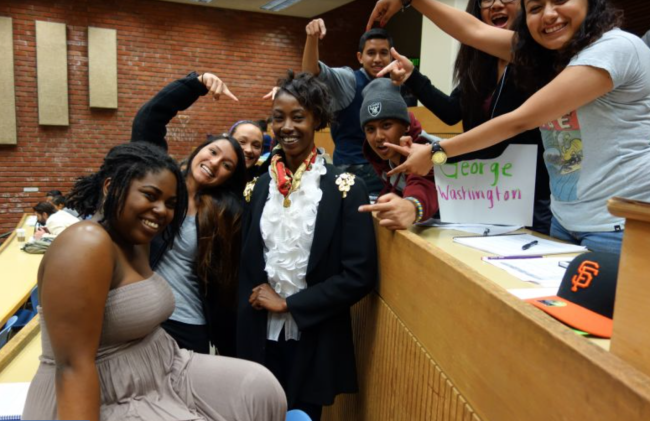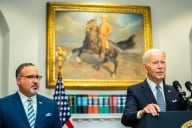You have /5 articles left.
Sign up for a free account or log in.

A Reacting to the Past-based U.S. History survey course at Cal State East Bay.
Bridget Ford
Love or hate the lecture, more and more professors are abandoning it for higher-impact teaching practices. Yet at most institutions, innovative instruction comes only from individual professors, at certain times, in certain courses. That is, the “magic” has yet to be bottled and broadly adopted across general-education programs or other key course offerings.
A new grant initiative affiliated with the popular Reacting to the Past curricula -- in which students participate in rigorous role-playing games to learn about historical events and debate ideas across disciplines -- is trying to change that.
“Reacting has spread rapidly to many different colleges and universities -- some 350 at present -- but the broader curricular implementation has been slower,” said Mark Carnes, a professor of history at Barnard College who invented the curriculum nearly two decades ago, to cure his students’ painfully apparent ennui. (He details the process in his 2014 book, Minds on Fire: How Role Immersion Games Transform College.)
Carnes added, “This grant seeks to focus on the hard work of implementing strong innovation in large curricular swaths.”
With games on everything from Athenian democracy to Charles Darwin and the rise of naturalism, Reacting has a huge following among individual professors across disciplines. Both faculty members and institutions make up the Reacting Consortium, housed at Barnard, with access to existing games and involvement with those in development. To call Reacting series games might by a bit misleading, by the way, since -- while fun -- they're heavy on reading and student preparation for in-class role playing.
A number of colleges and universities also have made Reacting a mandatory part of freshman experiences, majors or programs; Carnes and his fellow “gamemasters” -- as instructors are called during the multiweek units -- want more of that kind of involvement.
With support from the Endeavor Foundation, which supports the liberal arts, Reacting is accepting proposals for grants to help institutions further embed Reacting and its fundamentally active learning strategies into curricula on a broader scale. The grant guidelines are purposefully broad, but possible applications include those across departments, colleges and general-education curricula. Grants go to teams, not individual professors.
“We believe that we are enhancing the efforts of faculty and administrations to engage their students more deeply in their academic work, which we find critical,” said Ashley Kidd, a program officer at Endeavor. “Too often, we see students sitting in lecture halls disengaged. Self-reflection on the ways in which students actually learn best requires dedicated professors experimenting with enlivening and liberating pedagogies, such as the creative game-playing pedagogy that Reacting to the Past represents.”
Endeavor is about to begin accepting its second round of grant applications; the deadline is Dec. 1. (Note: This story has been updated to reflect that the Dec. 1 deadline is not for the final round of grants; the deadline for a third round is forthcoming.) Eighteen colleges will receive “mini grants” of $7,500 each to help them incorporate practices such as Reacting into their undergraduate programs.
Funds will primarily help five members from each institution attend a team-based track at the Reacting Winter Conference. In addition to Reacting experts, Peter Felten, assistant provost for teaching and learning and a professor of history at Elon University and co-author of the recent The Undergraduate Experience: Focusing Institutions on What Matters Most, is also scheduled to speak. Any remaining funds will go toward campus workshops, stipends for course development or travel to future conferences.
Kidd, of Endeavor, said that in helping faculty members to attend the institute, “we believe that we are also helping them to reflect on and experiment with their teaching such that they can then help their students to become more active learners, and, by extension, more critically engaged and active citizens in our democracy.”
Reacting is already the signature course of the Liberal Arts Honors Program at the University of Texas at Austin. Larry Carver, honors program director, said the class is one that prospective students visit and that graduates “remember and argue about years later.” He described Reacting as an “exciting and successful way of introducing students to great ideas and significant moments in history and doing so with a rigor and discipline that significantly improves the writing and speaking skills of our students.” One colleague believes that students who have taken a Reacting class are more likely to speak up in other classes, for example, he said.
Beyond the skills they acquire, “the delight the students take in the course is infectious,” Carver said (so much so that he’s actually changed an upper-division class to History at Play).
“That the class builds community can be measured in part by the reactions of [liberal arts honors] students who don’t elect to take Reacting. They feel a bit left out and often sign up for the course next semester,” Carver added via email. “As for their understanding of history, few students lose sight of what actually happened; all come away with a better understanding of what might have happened and why what happened actually did.”
John Burney, vice president for academic affairs at Doane University, which offers Reacting courses, will oversee how teams from the various grant recipients collectively strategize about implementation strategies and curricula. He said one common barrier to involvement in Reacting is time; professors worry about taking away from their material, especially in sweeping general-education courses. Yet time and again these courses prove “a natural home for Reacting, because they’re teaching critical-thinking and written and speaking skills," he said.
Students’ imaginations are engaged, he said, causing them to more deeply understand and retain essential content, Burney added.









